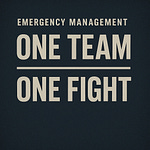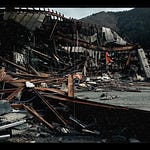Let's explore The 7 Habits of Highly Effective People by Stephen Covey.
I was talking with Dan Scott on the Leader's Cafe about attitude. We got into a deep conversation on how we react to outside pressures, how we deal with them and how those external pressures can impact our team. As leaders, we put on a good face and motivate our team. Right?
Attitude is everything. A positive attitude starts within, and sometimes you need a kick start to get it going; everyone falls into a rut occasionally. We feel tired, depressed, unmotivated, and downright aggravated by everything we encounter. When we are in this spot, we must take care of ourselves. First, we need to recognize that we are in a rut. Sometimes we need to have someone tell us that we are there.
In the field we have chosen to work in, we may feel we are letting down our team and the people we serve when we think about ourselves first. However, without self-care, we cannot help others.
My friend Brian Colburn is a massive fan of The 7 Habits of Highly Effective People and shares the lessons he has learned over the years with me. He even got me The 7 Habits of Highly Effective People card deck that I keep on my desk to remind myself to read a card weekly.
Brian says that habit #7, to sharpen the Saw, resonates with him the most.
What Does It Mean to Sharpen the Saw?
Sharpen the Saw means preserving and enhancing the greatest asset you have—you. For Covey, Sharpening the Saw is about renewing and refreshing the four dimensions of our natures — physical, spiritual, mental, and social/emotional.
As you renew yourself in each of the four areas, you create growth and change in your life. Sharpen the Saw keeps you fresh so you can continue to practice the other six habits. You increase your capacity to produce and handle the challenges around you. Without this renewal, the body becomes weak, the mind mechanical, the emotions raw, the spirit insensitive, and the person selfish. Not a pretty picture, is it?
Covey begins his chapter on Habit 7 with a story.
Suppose you were to come upon someone in the woods working feverishly to saw down a tree.
"What are you doing?" you ask.
"Can't you see?" comes the impatient reply. "I'm sawing down this tree."
"You look exhausted!" you exclaim. "How long have you been at it?"
"Over five hours," he returns, "and I'm beat! This is hard work."
"Well, why don't you take a break for a few minutes and sharpen that saw?" you inquire. "I'm sure it would go a lot faster."
"I don't have time to sharpen the saw," the man says emphatically. "I'm too busy sawing!"
We sharpen the Saw to become more effective in our life's work. It's about regularly investing in ourselves to reap dividends continually. As my father would say, haste makes waste work smarter, not harder.
We have systems that can help you be better at what you do. Software and processes that make you more efficient. However, they may not make you more effective.
While investing time in "self-care" may seemingly curtail your productivity in the short-term, it will significantly enhance it in the long-term, as you won't ultimately be sidelined by physical sickness, mental collapse, and just plain exhaustion.
Besides allowing you to get more done, regularly making time to take care of yourself also increases your sense of agency and effectiveness.
YOU decide what you do to sharpen your Saw. It's up to YOU to make sure you do those things. As you successfully take action on honing the unique blade of your life, you show yourself that you're an autonomous being. What's more, you increase your competency. As you grow your competency, you increase the influence you can have on the world outside of yourself.
So again, you don't have time NOT to sharpen the Saw. An excuse not to point out the Saw is for failure, burnout, and mediocrity.
Here are a few ways to avoid burnout and be more productive in the workplace and your own space. I have added these to my week. Some I do much better than others. However, it is my goal to make them a life habit.
Take a walk once a day for 30 min. (You can be on a phone call if you have to.)
Eat right; Fast food is not your friend.
Reading something that widens your knowledge. (you can get an audiobook for your walk)
Develop new skills. Fun things like Archery, fishing, or arts and crafts allow you to focus on something other than work.
Set some new goals for the week or month.
Organize one aspect of your home or office. (I clean my garage and organize my books)
For relaxation, go to the park, and walk in the woods.
Connect with your family, stakeholders, and friends. They all have different perspectives and ideas.
“Improvement doesn't just happen. Living a life in balance means taking the necessary time to renew yourself. It's all up to you. Or you can procrastinate and miss out on good health and exercise benefits. You can revitalize yourself and face a new day in peace and harmony. Or you can wake up in the morning full of apathy because your get-up-and-go has got-up-and-gone. Remember that every day provides a new opportunity for renewal–a unique opportunity to recharge yourself instead of hitting the wall. All it takes is the desire, knowledge, and skill." Stephen R Covey
Podcast
The Todd De Voe Show
Why Reading Matters For Leaders/ Hurricane Ian update
Why should you become an avid reader? Join Todd and Marc as they discuss the benefits of reading. Reading can improves intelligence and lead to innovation and insight. Studies have shown that reading makes you smarter through a larger vocabulary, more world knowledge, and abstract reasoning skills. Reading is one of the quickest ways to acquire and assimilate new information. Many leaders believe that reading across fields is good for creativity. And leaders who can sample insights in other fields, such as sociology, the physical sciences, economics, or psychology, and apply them to their organizations are more likely to innovate and prosper. Reading can also make you more effective in leading others.
Business Continuity Today
National Preparedness Month 2022: 9/11's Legacy
Since September 11, 2001, the U.S. Government has taken steps to encourage all citizens to make their own survival preparations. September was chosen as National Preparedness Month, as the tragedies of September 11, 2001, highlighted to the nation the importance of being prepared. Each week of September is dedicated to unique aspects of preparedness, from how to make or update a disaster plan, gather supplies for the kit, and communicate the importance of emergency preparedness for your community.
Prepare Respond Recover
A View of Hospital Emergency Management
One of the growing sectors in emergency management is healthcare. Hospital emergency management is a unique position in the healthcare system. They manage the integration of planning and response efforts within the physical campus and must interact with outside emergency response, emergency management, and public health agencies. Kelly McKinney, the Assistant Vice President of Emergency Management and Enterprise Resilience for NYU Langone Health, discusses how emergency management teams within the healthcare industry are working to overcome the issues they currently face in this ever-changing world.
If you would like to learn more about the Natural Disaster & Emergency Management (NDEM) Expo, please visit us on the web - https://www.ndemevent.com
What To Read
What it takes to lead now
Competencies are shifting from what to do to who you are, according to Eric McNulty, who examines how best to prepare the next generation of leaders to be ready when lives, reputations, and the ability to operate are on the line.
The new battlefield is your brain
Information warfare is an integral component of military strategy, says Ekaterina Kostioukhina. We have entered a dark age of disinformation where the effects of cyberpsychology and neurocognitive warfare present a real threat to democracy, peace, and human rights.
Happening Around The Profession
Supporters
DisasterLAN (DLAN) emergency management solution
Disaster Tech Decision science platform for risk and resilience
Titan HST The World's Most Innovative Mass Communication Platform


















Share this post